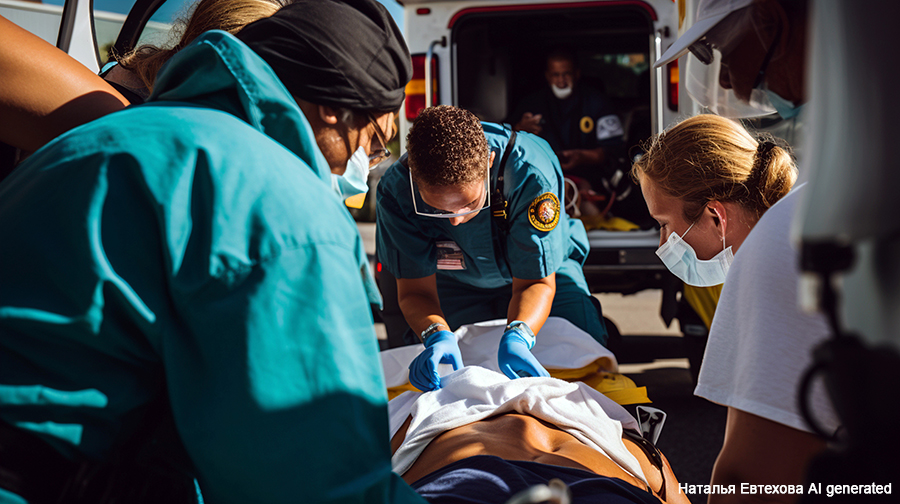 Mass shootings. Bioterror attacks. Natural disasters. Wars. There’s seemingly no shortage of potential mass-casualty incidents (MCIs) that can lead health care professionals, including hospitalists, into response roles. Knowing how to respond in the moment to an MCI can be overwhelming, but planning can help. Here are some ways to plan for and respond to MCIs that could affect your hospital.
Mass shootings. Bioterror attacks. Natural disasters. Wars. There’s seemingly no shortage of potential mass-casualty incidents (MCIs) that can lead health care professionals, including hospitalists, into response roles. Knowing how to respond in the moment to an MCI can be overwhelming, but planning can help. Here are some ways to plan for and respond to MCIs that could affect your hospital.
Why hospitalists play such a critical role in MCIs
Hospitalists can and should play a critical role in responding to MCIs for a few reasons.

Dr. Jones
One major reason is that hospitalists are used to being flexible, and they know how to navigate a hospital quickly and safely, said Riley Jones, MD, MSc, FACP, an assistant clinical professor of medicine and global health with the department of medicine, division of hospital medicine, at the University of Florida in Gainesville, Fla. All of this will come in useful during an MCI response. Dr. Jones is active with the nonprofit group MedGlobal and helps hospitals prepare for a war footing and for coming under direct attack. He has assisted in war zones such as Syria and Ukraine.

Dr. Persoff
The role that hospitalists can play in responding to a larger-scale emergency became evident during the COVID-19 pandemic, said Jason Persoff, MD, SFHM, an associate professor of medicine and assistant director of emergency preparedness at the University of Colorado Hospital in Aurora, Colo. With COVID-19, the disaster unfolded over several years, and that required proper stewardship of inpatient care for those who were ill. “Many hospitalists don’t realize just how important their participation in an unfolding multi-casualty trauma incident can matter,” Dr. Persoff said.

Dr. Frank
Plus, hospitalists are well-positioned to assist those who may require prolonged hospitalizations and the worsening of their chronic medical problems due to displacement and disrupted care, said Maria (Gaby) Frank, MD, FACP, FAOS, SFHM, a hospitalist in the division of hospital medicine and medical director of the bio-containment unit at Denver Health Hospital Authority in Denver. Dr. Frank is chair (and Dr. Persoff is co-chair) of the SHM’s Disaster Preparedness and Management Special Interest Group.
It also helps that hospitalists have a broad range of medical knowledge, which aids in responding to a range of disasters, Dr. Frank added.
Preparing in advance
- One key part of responding to a mass-casualty incident is preparation, on the part of both hospitalists and the hospital as a whole. There are several ways to make sure your hospital does what it can to prepare for a potential MCI:
- Work with hospital leadership on an MCI response plan. Your hospital already may have such a plan but if not, now’s a good time to get one in order. Many hospitals developed recovery plans (although not necessarily response plans) after the terrorist attacks on Sept. 11, 2001, Dr. Jones said. Of course, medicine has evolved since then, and the need for a proactive response plan is crucial. Hospitalists should work with administrators as well as emergency department (ED), surgical, and critical-care leaders to draft a plan. “Hospitalists should not assume that everyone else at the hospital has a plan,” Dr. Persoff said.
-

Dr. McKenzie
Continually update existing response plans and other disaster-related documents. Make disaster management a regular part of business meetings or grand rounds, Dr. Persoff advised. That way, both hospitalists and other relevant emergency managers at the hospital keep plans up-to-date and can always identify clinical skills that may need to be addressed before an MCI. As you update plans, make sure to consider where an influx of additional patients may stay, Dr. Jones advised.
- Advocate for an MCI simulation at your hospital. “The more you practice these skills, the more comfortable you will feel in a critical scenario,” said Sheena G. McKenzie, MD, MBA, FAAP, a pediatric hospitalist with Advocate Children’s Hospital – Oak Lawn in Oak Lawn, Ill. Dr. McKenzie said these skills helped her feel prepared to respond to the Highland Park, Ill., mass shooting in 2022 while working at the Highland Park hospital because she had practiced and reviewed roles, processes, and timelines ahead of time in a simulation.
-

Dr. Anderson
Use continuing medical education to address any additional skills you may need during an MCI or to focus on MCI preparedness overall. Joe Anderson, DO, FAAP, a pediatric hospitalist with Central Maine Healthcare in Lewiston, Maine, helped respond to the mass shooting that occurred there last year. He credits a Stop the Bleed course he took at the CME conference a few years ago to teach him how to apply tourniquets and how to use combat gauze to help control traumatic bleeding. “These topics are not consistently covered in medical school or residency training depending on your specialty,” he said. You also can use available resources, such as webinars from the SHM’s Disaster Preparedness and Management SIG and free just-in-time resources from the Mountain Plains Regional Disaster Health Response System, Dr. Frank said.
- Work with family members to plan who will care for kids, older family members, and pets should you be responding to an MCI, Dr. Frank suggested.
In-the-moment tasks for hospitalists
If an MCI has happened, there’s probably the urge to try to do everything and anything, all at once. Instead, take a step back. “Don’t just do something, stand there. Take a beat and get organized,” advised Dr. Persoff, a former EMT and long-time storm chaser who volunteered to respond when an EF-5 tornado destroyed one of two hospitals while he was chasing a tornado in Joplin, Mo., in 2011. “The ED will be very busy, and rushing down there on your own without a plan for continuity of operations of patients you’re already caring for is a mistake.”
Ideally, your hospital will have a response plan in place that you can follow should a disaster strike. Yet there are other guiding ideas to keep in mind:
- Check-in with your Hospital Incident Command System to find out where you can be most helpful. “Don’t try to figure this all out on your own, or you will be overwhelmed and ineffective,” Dr. Persoff said. In advance of a possible MCI, find out in advance if your hospital has such a system.
- Plan on doing tasks that are suited for hospital medicine, Dr. Frank advised. This includes:
- Offloading in the intensive care unit
- Helping the ED to triage and manage patients
- Managing surgical patients on the floor while surgeons are in the operating room
- Streamlining discharges so that more beds become available
- The specific tasks you’ll do may already be spelled out in the disaster response plan.
- Even with specific roles, find other ways you can help. During the Highland Park mass shooting response, Dr. McKenzie helped trauma-surgery and emergency-medicine peers to care for pediatric patients in the ED (she now works at Advocate Children’s Hospital). This included assisting in a pediatric code, communicating status updates between operating-room staff and patients’ families, arranging transportation for patients who needed to be transferred, and eventually helping with vital signs on adult patients in the ED. However, there was also a lot of time spent with families to share hugs, hand holding, and expressing emotions, she added.
- Reach out for additional resources earlier rather than later if you think you’ll need them. Don’t wait until you feel short-handed, Dr. Anderson advised. “We were fortunate to have two pediatric-hospitalist colleagues from a local private practice who responded quickly to our call for help,” he said.
- If you’re home, don’t rush to the hospital unless you’re asked to do so, Dr. Frank advised. She added that you don’t want to be in the way, and there will still be a need for fresh and rested responders during a second shift. When planning, disaster-response groups should consider staffing for the next eight hours after an MCI occurs as well as for the following few days, Dr. Persoff said.
- Take a moment to pause. “After the busiest part of the day in the ED, the team took a few minutes to come together and pause,” Dr. McKenzie said, referring to the Highland Park shooting response. “We stood together in silence reflecting on the lives saved and lives lost that day.”
Helping process what happened
After a mass-casualty incident, it’s normal to feel a range of emotions, from sad to mad to exhausted. Some hospitalists said they still aren’t sure how to handle the emotional impact of an MCI. Still, there are some things you can do to help manage your emotional health.
Seek help—don’t try to tough it out. Take advantage of employer resources, therapy, and structured listening sessions that help you to process what happened. “Suicide, burnout, and drug and alcohol addiction all occur with very high rates in individuals who try to ‘be tough’ and not talk about their feelings,” Dr. Persoff said. Dr. McKenzie found it helpful to take part in an open-forum discussion in the pediatric hospitalist group to work through emotions out loud.
Realize that what helps you emotionally may be very different from what works for your colleagues, even if you all worked side by side during the incident, Dr. Anderson said. It’s all okay, so long as it works toward healthy healing.
Try to separate the humanity of treating patients from the injustice that occurred, Dr. Jones said. This is something he reflected on after witnessing war-zone injuries in places like Ukraine. If possible, find a time to focus on and heal from your role as a physician during an MCI, and then find a separate time or way to process the injustice or bigger-picture issues that are involved.
Advocate. Responding to gun-violence incidents led both Drs. Anderson and McKenzie to turn to advocacy. Dr. McKenzie is now involved with several local and federal advocacy opportunities related to gun-violence prevention. “I have learned to heal from the trauma of that day by sharing with others and advocating for safer communities for children,” she said. Dr. Anderson is part of a recently formed multi-specialty coalition of physicians and advanced practice providers, called Maine Providers for Gun Safety, calling for common-sense gun-safety legislation.
Vanessa Caceres is a medical writer in Bradenton, Fla.

Great article! Having recently retired as the Senior Director of Emergency Management for The Cleveland Clinic, I’ve found that many hospitals still don’t have proactive Mass Casualty Incident (MCI) programs that are more than adequate. Each of our hospitals had designated places for transportable beds, nurse stations, WOWs compatible, pharmaceuticals, EPIC overlay for patient information, etc. We ranged from having large hotel access to set up 150 beds, to smaller hospitals that could only house 20 additional patients. In it’s simplism form, patients ready for discharge within 24/48 hours would be transferred to the beds, making room for MCI victims in the bed towers. Of course, conducting exercises to assure everyone understands their functions, is essential.